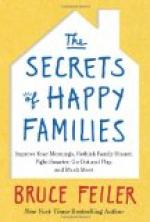Happy said a good deal and “betche” several things would happen—things utterly inconsistent with one another. In the end, Andy pinned him down to twenty dollars against Andy’s silver-mounted spurs—which was almost a third more than the spurs were worth; but Andy had no sympathy for Happy Jack and stuck to the price doggedly until Happy gave in.
Jack Bates advertised his lack of faith in Andy ten dollars worth, and Cal Emmett did the same. Irish, coming in on the afternoon train and drifting instinctively to the vicinity of the Happy Family, cursed them all impartially for a bunch of quitters, slapped Andy on the back and with characteristic impetuosity offered a hundred dollars to anybody who dared take him up, that Andy would win. And this after he had heard the tale of the blue roan and before they told him about the two rides already made in the contest.
It is true that Happy Jack endeavored to expostulate, but Irish glared at him in a way to make Happy squirm and stammer incoherently.
“I’ve heard all about it,” Irish cut in, “and I don’t have to hear any more. I know a rider when I see one, and my money’s on Andy from start to finish. You make me sick. Weary, have you gone against our man?” The tone was a challenge in itself.
Weary grinned goodnaturedly. “I haven’t pulled down any bets,” he answered mildly, “and I haven’t put up my last cent and don’t intend to. I’m an engaged young man.” He shrugged his shoulders to point the moral. “I sure do hope Andy’ll win out,” he added simply.
“Hope? Why, damn it, yuh know he’ll win!” stormed Irish.
Men in their vicinity caught the belligerence of the tone and turned about, thinking there was trouble, and the Happy Family subsided into quieter discussion. In the end Irish, discovering that Andy had for the time being forsworn the shelter of the Flying U tents, stuck by him loyally and forswore it also, and went with Andy to share the doubtful comfort of the obscure lodging house. For Irish was all or nothing, and to find the Happy Family publicly opposed—or at most neutral—to a Flying U man in a rough-riding contest like this, incensed him much.
The Happy Family began to feel less sure of themselves and a bit ashamed—though of just what, they were not quite clear, for surely they had reason a-plenty for doubting Andy Green.
The last day found the Happy Family divided against itself and growing a bit venomous in its remarks. Andy had not as yet done anything remarkable, except perhaps keep in the running when the twenty had been culled to three: Billy Roberts, Andy and a man from the Yellowstone Valley, called Gopher by his acquaintances. Accident and untoward circumstances had thrown out the others—good riders all of them, or they would not have been there. Happy Jack proclaimed loudly in camp that Andy was still in because Andy had not had a real bad horse. “I seen Coleman looking over the blue roan and talkin’ to them guys that runs things; they’re goin’ t’ put Andy on him t-day, I betche—and we seen how he can ride him! Piled in a heap—”




